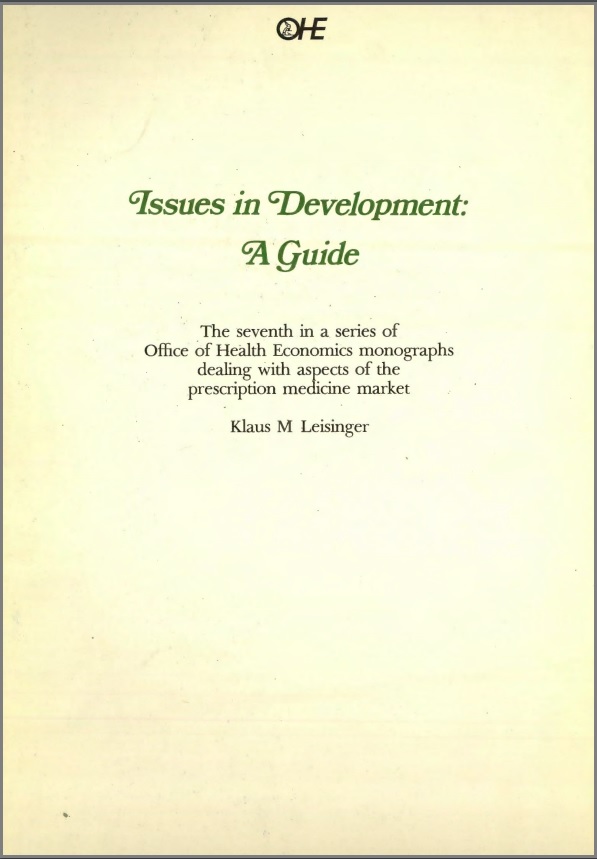Unlike the great majority of OHE publications, this paper was not researched and written ‘in-house’. It is a minimally edited translation of a study prepared in…
Unlike the great majority of OHE publications, this paper was not researched and written ‘in-house’. It is a minimally edited translation of a study prepared in German by Dr Klaus Leisinger of the Swiss company CIBA-GEIGY. Hence its style, and at certain points…
Unlike the great majority of OHE publications, this paper was not researched and written ‘in-house’. It is a minimally edited translation of a study prepared in German by Dr Klaus Leisinger of the Swiss company CIBA-GEIGY. Hence its style, and at certain points its interpretation, differs from that of OHE; yet as regards the basic sentiments expressed OHE fully supports the line taken.
Our objectives in publishing this English version are basically two fold. First, it contains a wealth of fact useful to anyone who wishes to gain an informed view of third world health care problems and requirements. Second, it provides an example of how some major multinational pharmaceutical companies are working to build up a sensitive understanding of the needs of the poor nations, and of how they can play an appropriate part in meeting them.
Dr Leisinger stresses the need to utilise technologically based contributions to development prudently; that is in a manner compatible with the social and cultural conditions prevailing in each less developed nation. For example, agriculture is an area where companies like CIBA-GEIGY can rightly take a degree of credit for creating the tools of the ‘green revolution’. But they will only contribute effectively to mass wellbeing in the third world if used hand in hand with the help poorer farmers and landless labourers need in the form of job opportunities, credit facilities, land redistribution, economic incentives and the like.
Similarly, with regard to demographic transition, Dr Leisinger notes that life preserving medicines (and the availability of contraceptives) may in time help to reduce expressed fertility and so ultimately reduce population growth rates. Yet his work also stresses the urgent need to understand the social determinates of fertility behaviour if desired changes are to be achieved before Malthusian disaster overwhelms the third world poor. He highlights issues like the need to liberate women from past positions of disadvantage relating to matters like their access to education.
Regarding the role of multinational companies in the process of development, the paper argues forcibly that it is a potentially desirable one. In terms of increasing capital investment, domestic production and third world trade balances, the role of multinational private enterprise is benign: isolated examples of ill-judged or clearly immoral behaviour coupled with propaganda from the critics of the social-market system should not obscure this fact. But Dr Leisinger’s theme of technological advance via socially appropriate application needs constantly to be restated; the contributions of the western multinationals can only be optimised if there is an ongoing process of checking the relevance of their products and their policies to local community needs.
In the specific context of pharmaceuticals this is a timely reminder. The current activities of Health Action International participants (HAI is a loose grouping of like-minded bodies co-ordinated in part by the International Organisation of Consumer Unions) are aimed at increasing political pressures on medicine manufacturers. As part of this international programme the charity Oxfam has, for instance, recently organised a series of meetings aimed at linking potentially damaging domestic attacks on British industry to third world medicine supply concerns.
To the extent that actions like this last encourage the pharmaceutical industry to adopt clear and responsible policies towards the poor they must be welcomed. But they should not be permitted to mislead the public into believing that multinational industry is currently unconcerned, or that it has nothing to offer the least advantaged communities of the world. This paper gives some important insights into the nature of the benefits the major drug houses generate.
It can be argued (perhaps in contrast to the line adopted in documents like the Brandt Report) that good health is not just a bi product of the economic process of development: it is its central goal. The inherent value of a full life span free from disability coupled with the survival of one’s family and friends far outweighs any other ‘lifestyle’ gain that social and economic progress may bring. With this point fully perceived the future role of the innovative pharmaceutical industry and the powerful curative therapies and preventive techniques it has contributed and will contribute to our global society will surely be seen as an important one.
Yet here again benefits will be maximised only if the social and economic factors relating to drug usage are fully understood and appropriate policies pursued. There may be a need at present, for instance, to involve traditional health practitioners more closely in the distribution of basic modern medicines in poor areas. Failure to do so could delay unacceptably the translation of initiatives like the WHO’S Drug Action Programme into practical reality.
